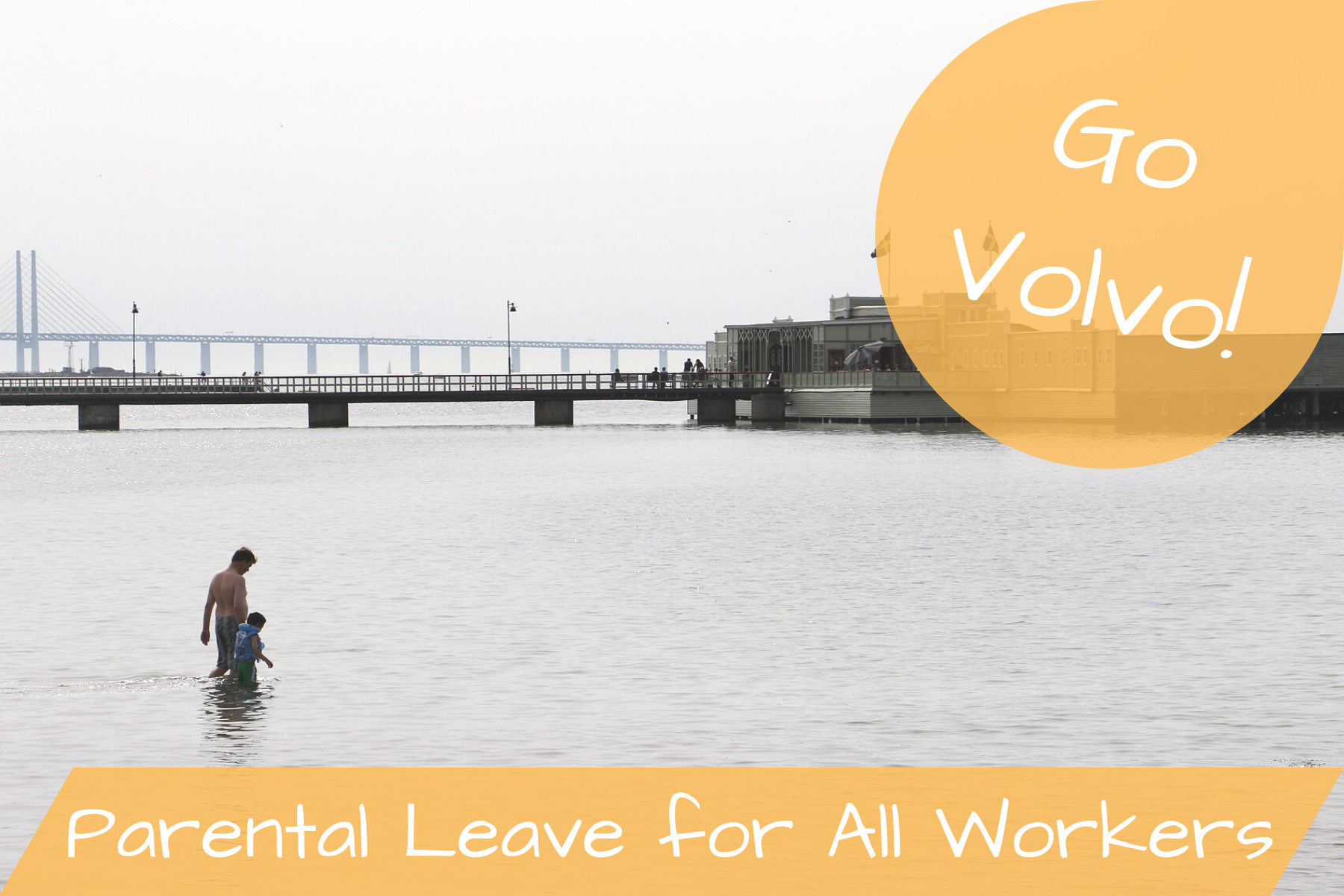Volvo Offers Parental Leave for 40,000 Global Employees Posted by Chelsea B on Apr 16, 2021 in Business, Culture, News
Free daycare and education, state healthcare, and a whopping 480 days of parental leave. Say what?! The Nordic countries have long been shining examples of the welfare system with state-subsidized benefits aplenty. Sweden especially boasts that it’s one of the most family-friendly countries in the world due to its generous parental leave. Volvo has recently announced that all of their 40,000 employees, not just the once in Sweden, but globally, will be offered paid parental leave, regardless of gender. Today we’ll dig into föräldraledighet (parental leave) and the benefits that accompany it in Sweden, and elsewhere. We’ll also learn a few words that are helpful to know when discussing this topic in Swedish. Read on!
Volvo’s Reasoning
Volvo Cars CEO Håkan Samuelsson shared the company’s motivation for granting parental leave to all employees:
”Vi vill skapa en kultur som stöder ett jämställt föräldraskap oavsett kön. När föräldrar får hjälp med att balansera kraven från arbetet och familjen bidrar det till att minska klyftan mellan könen och gör att alla kan göra karriär”
We want to create a culture that supports equal parenting regardless of gender. When parents get help balancing the demands of working and having a family, it contributes to lowering the divide between genders and makes it possible for everyone to keep their career.
As quoted from Göteborgs-Posten, 30 March 2021
Compare and Contrasting Benefits
Now, Vovlo is sponsoring 24 weeks of parental leave to all of its 40,000 employers worldwide. The World Health Organization points out that “Although many countries have maternity protection legislation, only 99 (out of 185) meet or exceed the minimal 14 weeks of paid maternity leave recommended by the International Labour Organization (ILO),17 57 countries meet 14–17 weeks of leave, and just 42 countries meet or exceed 18 weeks leave.” Hmmm…. 🤔 this made me curious so I dug up some stats using the International Labour Organisation (ILO)’s website to see how other countries stack up:
Sweden: If both parents take parental leave, up to 480 days of leave is granted, with about 80% of pay on average. These leave days can be used until the child is 8 years old. This covers newborns, adoptions, for all couples, regardless of gender or sexual orientation.
European Union: Women in the E.U., regardless of the country, have the right to at least 14 weeks of maternity leave with an added two weeks before and after giving birth. This varies from 5 months in Italy to 12 weeks in Turkey.
Finland: In Finland, the mother has the right to 105 weekdays off. After that period, both parents share around 5 months of parental leave. Also, if you haven’t heard of Finland’s baby box, you need to check it out, ASAP. Talk about providing a kick start for all new babes born, look at those stylish onesies!
Asian countries tended to have similar leave than E.U. countries. Japan offers 14 weeks maternity leave at 60% pay, and China offers 90 days at 100% pay.
North American countries Canada and Mexico offers paid maternity leave. Canada pays 55% of your wage for 17-18 weeks, and Mexico covers 100% of your wage for 12 weeks.
United States: The U.S. does not actually have a federal paid maternity. FMLA, The Family and Medical Leave Act guarantees 12 weeks of unpaid leave to care for a newborn, newly adopted child, or an ill family member. Depending on the state you live in, or your employer, you may receive additional benefits. At 3 months families must consider childcare which can be costly and difficult to find depending on where you live… 🤯 ‘nuff said.
Word of the Day!
Now, Transparent Language has a Swedish word of the day. And if you don’t already subscribe to it, do that now, Swedish nerds!🤓🇸🇪 Our word of the day is föräldraledighet. We can use the pieces of this compound word in a few ways:
First, the noun for parent/s:
en förälder → föräldern → föräldrar → föräldrarna
a parent → the parent → parents → the parents
Kommer dina föräldrar också ikväll? Are your parents coming this evening, too?
föräldraledig is the adjective to mean that one is on parent leave, combining the nouns förälder and ledig:
en ett plural
föräldraledig → föräldraledigt → föräldralediga
–När är du föräldraledig, Johan?
-Jag är föräldraledig från september till februari nästa år.
-When are you on parental leave, Johan?
-I am on parental leave from September to February next year.
You may also use the adjectives pappaledig and mammaledig, accordingly. And at last, combine the noun and adjective to get our word of the day föräldraledighet (parental leave)!
For more on Volvo’s new policy, give this Sveriges radio story a listen. Then cross your fingers that this sets the stage for other international companies to follow suit and initiate more family-friendly policies like this one!
What’s parental leave like where you live? Tell us in the comments below?

Build vocabulary, practice pronunciation, and more with Transparent Language Online. Available anytime, anywhere, on any device.





Comments:
Duncan:
Strangely, the Transparent Language Swedish Word of the Day webpage tells me that the 16 April 2021 WOTD is “to finish reading”.
Chelsea B:
@Duncan That’s perfect! I wonder what you have on your “finish reading” list?
I’m working on Jason Diakité’s En droppe midnatt. Maybe I’ll finish it this weekend.
Duncan:
@Chelsea B Mikael Niemi’s Populärmusik från Vittula – so far only in English translation though ;-).
Chelsea B:
@Duncan Oooooh, a classic! I’ve been to Pajala, definitely recommend a visit after reading the book.